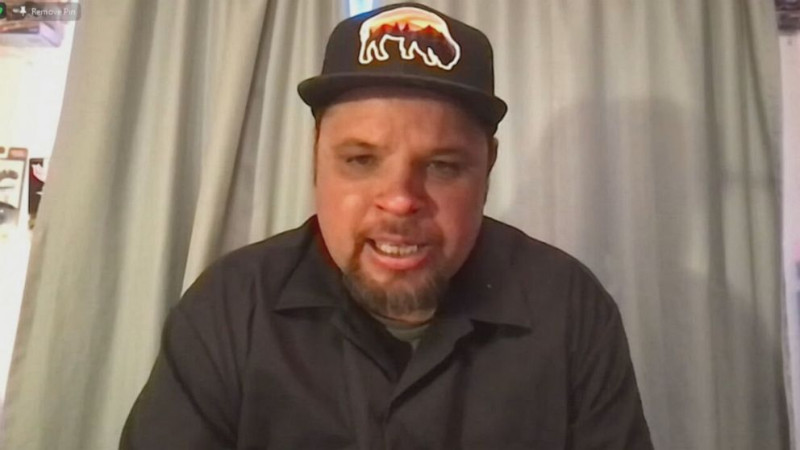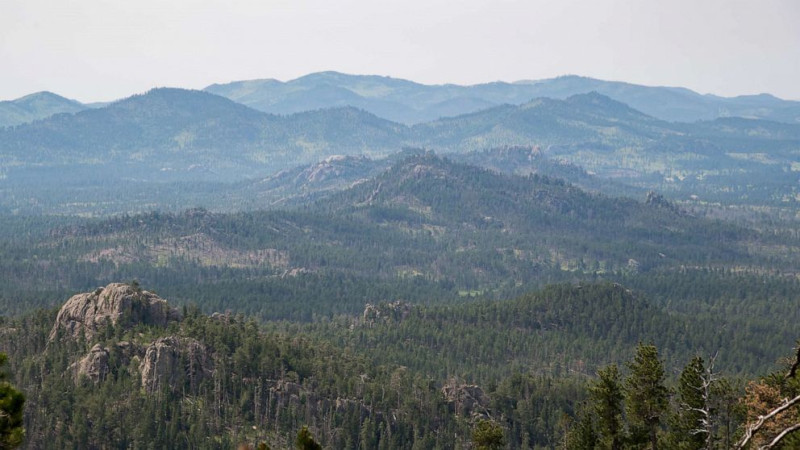Filmmaker chronicles Lakota fight to regain Black Hills
The U.S. Supreme Court in 1980 ordered over $100 million to be paid to the Great Sioux Nation after ruling the U.S. government broke a 19th century treaty by taking control of the Black Hills from the group of Native American tribes that includes the Lakota people.
With interest, that sum is now around $2 billion, but the Great Sioux Nation still refuses the money, saying the land was never for sale.
A new documentary, “Lakota Nation vs. United States,” chronicles the promises broken by the U.S. and the Lakota fight to regain their sacred lands. Filmmaker Jesse Short Bull spoke to ABC News’ Juju Chang about learning about his family’s connection to the dispute and what he believes restorative justice could look like.

JUJU CHANG: I know you grew up only a mile from a reservation in South Dakota. Yet you say for much of your life you had no understanding of the history of the land that you grew up on. Tell us about what you came to learn, including your own grandfather's connection to the dispute over the Black Hills.
JESSE SHORT BULL: Yeah, for sure. I mean, I grew up just as any other kid in America and in South Dakota. But I quickly discovered that something wasn't right or there was something missing, ‘cause I had an indigenous last name, Short Bull, but I didn't understand where that name came from.
I didn't understand that there was tension between the Oglala tribes that I grew up around and non-Oglala people. That put me on a pursuit to find history that was not given to me. It took a lot of a lifetime to try and understand how I, you know, fit into this and why things are the way they are today.
CHANG: Sure, and so much of that history is both hidden and dark. You know, I didn't realize that in 1980, the U.S. Supreme Court ordered over $100 million to be paid to the Great Sioux Nation because of the broken treaty. So with interest, that sum is now around $2 billion. But despite the poverty, the Great Sioux Nation still refuses the money, saying the land was never for sale. Tell us about that.
MORE: For some Native Americans, Mount Rushmore is a symbol of broken treaties, white domination
SHORT BULL: I mean, it's centered to Lakota worldview. And that worldview is, it's hard to sell something like selling a piece of yourself. How can you sell a piece of yourself, as one of our subjects in a documentary so eloquently put? And that's something that our tribes have been adamant about refusing, but there's sometimes, there's something more. And that's the connection to the land, which is inherent to our identity.
CHANG: You know, when we talk about stolen land, we often hear about reparations, right? But you argue that that may not be enough. So what does restorative justice look like?
SHORT BULL: I think that there's a lot of opportunities that can help establish the Oceti Sakowin tribes back within their relationship with their ancestral homelands or their homelands decreed by treaty. And a lot of that is looking at federal lands and public lands, and how we can enhance or figure out a way to create a path moving forward, to make this right, make this injustice right and try to fix it.

CHANG: You know, it's woven throughout the film, the visuals, stirring visuals of the beautiful shots of the sky, rivers and nature that make up the Black Hills. Why is it that giving voice to the land itself important to the story and take us through your decision in your filmmaking to do that?
SHORT BULL: My co-director, Laura, and I, we really wanted to try to let the land speak. And, you know, obviously, we can't interview the land. We can't set up lights or anything. But there is something profound and stunning imagery that we have of this beautiful part of the country. And whatever language is embedded in those images, we really wanted to enhance, to try and let it speak for itself.
CHANG: Well, the film is a triumph. Jesse Short Bull, thank you so much for being here and sharing your story with us. And “Lakota Nation vs. United States” is out in theaters now.
Disclaimer: The copyright of this article belongs to the original author. Reposting this article is solely for the purpose of information dissemination and does not constitute any investment advice. If there is any infringement, please contact us immediately. We will make corrections or deletions as necessary. Thank you.







